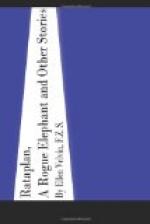In some curious way the gate of the paddock opened, and Osra—proving, with all his high opinion of himself, how extremely stupid he could be on occasion—walked gravely in. As soon as he was in, the gate of the paddock closed in the same mysterious way, and it was not until he had been talking to the strange ostrich for some little time that he realized, with an awful shock, that his wives and children had gone, and that he was a prisoner.
Now, he had liked the strange ostrich very much, and, although she had told him that she was not an African ostrich, he thought her very beautiful; at the same time, he did not wish to stay with her altogether, away from his wives and children, and, as soon as he found that he was a prisoner and that they had gone, he did his very best to make his escape.
But the paddock was strong, and, although Osra could run round and round it in a few minutes, he could neither jump nor fly over the fence.
And so, in spite of his great strength, in spite of his huge body and wonderfully muscular legs, he could do nothing, for he could not fly. And so he had to suffer the punishment for the wrong-doing of his predecessors.
He was as savage and dangerous as he could be for a long time, and his captors were extremely careful to keep out of the reach of his hard, straight bill and strong, powerful legs.
For a little while he would not even eat, but this did not last long, and it was by the persuasion of his new friend that he began to take his food again.
Once having done this, he grew more reconciled, and, as he found that his new companion was very beautiful, he began to forget his wives and children, and in time—although not without many struggles to get out and many savage onslaughts at the fences—he settled down into an ordinary African farm ostrich, and was perhaps just as contented as any of his companions.
He never saw his wives and children again; for the matter of that, he did not want to. In time he had six wives of his own at the farm, and strutted about in his grave, dignified and conceited way, proving himself a fairly good husband, but always ready for and somewhat greedy about meals. And, although he was never allowed out on the farm, as some of the American ostriches were, he grew in time to be quite contented, and even fairly happy.
SEELA, THE SEAL
There had been a terrible storm on the Pacific coast—such a storm as even the oldest fisherman, who had lived in the same little fishing village on the North American shore all his life, never remembered to have seen before.
For days sulky, smoke-like clouds had been gathering in the sky, while the sea grew darker and darker in hue, until its darkness was accentuated into an inky appearance by the white-capped waves, which grew bigger and fiercer as each hour drew on. And at last the storm had burst after a deadly silence that could almost be felt—burst with such vindictive fury that houses and buildings, which had stood steadfast for years, toppled and fell down like a house of cards, while the stately vessels which had braved many a storm were tossed about and wrecked upon the rocks.




